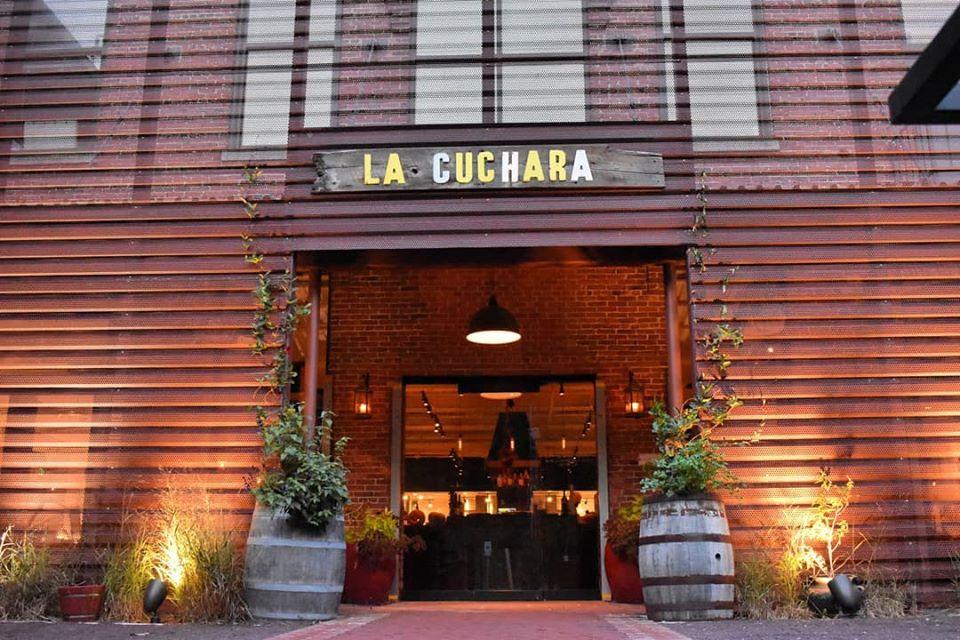
While La Cuchara chef-owner Ben Lefenfeld is exhausted from working long days, he’s grateful to be busy. “We’re all tired from carrying lots of heavy things and large batches of food,” he says, “but we’re also really happy to have something to do.”
As restaurateurs reinvent their business models, Lefenfeld, along with his wife, Amy, and brother, Jake, have decided to broaden their Basque Country-focused concept and offer prepared foods spanning the globe, from peanut noodles to spicy coconut curry. They have also launched a virtual grocery store featuring basic, but now sometimes hard-to-find, grocery items like sugar, yeast, fresh garlic, and even toilet paper and latex gloves. This week, says Lefenfeld, “We are adding a bunch of seeds to our list, including some heirloom tomato seeds.”
When there is downtime, he and Amy go mushroom hunting with their bull mastiff, Bella, and binge watch FX Networks’ Baskets. “Revamping our business model has had me using the Peloton even less than I usually do because I’m so exhausted,” says Lefenfeld. “I keep telling my parents I’m going to drop it off for them at their house in Columbia.”
Why did you decide to reinvent your business model this way?
The first week-and-a-half to two weeks, we operated with to-go food that was normal La Cuchara food, but I’m not happy with how La Cuchara food travels. When you’re talking about croquettes and things coming off the wood grill, it’s not conducive to being brought home. That was coupled with some of our guests asking for toilet paper, flour, and other items that we don’t typically sell, but we are doing it because these are good clientele trying to support us. We basically sat down and said, ‘We’ve identified that there’s a need in the immediate community for people to go out and procure basic staples,’ and we needed to rethink our business model, including the markup. We wanted to make sure that we weren’t charging a luxury price for the curbside pickup but adding it as a resource instead.
So how is the new model supporting your staff?
We are trying to keep people employed. All the orders have a 10-percent gratuity added. Since day one that’s been going to our hourly staff, along with a percentage of gift card sales, so up until this point we’ve been able to pay our hourly staff a fairly decent wage. In the first four weeks, we distributed $25,000 to hourly staff members.
“At a place like La Cuchara, where the happy hour is very popular and people like to crowd around the bar, we don’t even know if there’s still going to be a desire for that experience.” —Ben Lefenfeld
What does it feel like to walk into the restaurant without guests or most of your staff?
Just to set ourselves up for this, we’ve had to move refrigeration around. We’ve had to come up with a whole system of how we pack bags and we’re truly shocked at how many [regulars] order from us—people with the same first and last name who order on the same day. It has been extremely complicated and outside of our wheelhouse, so we’ve had to figure out ways to double check ourselves and make sure we are accurate.
What will La Cuchara look like when things reopen?
The biggest question is what the rules will be when we are allowed to reopen, because at a place like La Cuchara, where something like the happy hour is very popular and people like to crowd around the bar, we are not going to be able to offer that experience. We don’t know if there’s even going to be a desire for that experience. When we are allowed to reopen, we might continue to do a partial marketplace, so people have that as a resource. It just depends on what is needed at the time.
How are you staying inspired as a chef?
It’s a guilty pleasure being able to cook whatever food I want. That is the one thing that is keeping me going at this point, figuring out what comfort food to make and being able to run with it and offer it at an affordable price. I’ve made jerk chicken and tamales. This week we’ll have lobster bisque and smoked duck breast. It has been fun to look through cookbooks.
Any suggestions for the home cook on getting inspired? I love going on the internet and researching dishes. Say you want to make tamales, like we are making this week. There are so many different approaches to every dish. You don’t need to stick to one recipe, although you do need to be cognizant of how combining different components can impact the final outcome. But it’s really important to do research and have fun with it and get different perspectives on how to approach a different dish.
“A lot of daily life revolves around the dinner table, but that dinner table isn’t always at your house.”
What items should everyone have in their pantry?
Pasta and rice because they’re so versatile. You should have great olive oil, and I love to have conservas (tinned fish) at my house. I just ordered anchovies for myself from Despaña in New York, though they’re pretty pricey. Whether you’re getting anchovies or mussels in escabeche, it’s all shelf stable, fished at the peak of its freshness, and sustainable. And it’s super high-quality if you’re buying the right stuff.
It’s ironic that your last new concept, The Hot Dry, which closed in October, was centered around the food of the Hubei province of China, which is where Wuhan is located.
It’s just a crazy, crazy coincidence, and it would have been tough to operate a restaurant inspired by the Wuhan region of China throughout this pandemic. It was expensive to get out of that lease when we did and we did pay a lot of money to get out of it, but it would have been really hard to try to operate another set of staff.
“It’s just a crazy, crazy coincidence, and it would have been tough to operate a restaurant inspired by the Wuhan region of China throughout this pandemic.”
What changes need to happen in hospitality?
There needs to be a rethinking of the labor model, meaning revenues need to be distributed more evenly between the front-of-house and back-of-house staff. Tips would not be accepted but prices would have to go up—that’s just one way it could be attacked. Some restaurants have been doing it for a while now, but we are not in a position to be able to do it. Still, it’s something that’s important to the industry.
Also, across the board, restaurants need to try to focus on the needs of their community, rather than the dream of what the owner-chef wants to cook. Just because you specialize in Mediterranean cuisine or have a fancy restaurant, you might not be in a situation or a demographic that really values that.
Are you thinking about what will be on La Cuchara’s menu when you reopen? I’ve been doing lots of research and there are a lot of things in the pipeline. I’m starting to work on testing here, but for the most part, I’m just really excited to get the staff and guests back in here, whom we miss.
“Across the board, restaurants need to try to focus on the needs of their community, rather than the dream of what the owner-chef wants to cook.”
Why do restaurants matter?
Restaurants are really special gathering places in people’s lives to celebrate, and also where they go to unwind and commiserate. A lot of daily life revolves around the dinner table, but that dinner table isn’t always at your house. Every morning I still walk in, turn the lights on, and look at the 86 board [items that have sold out] expecting that there will be things crossed off from the night before. It’s one of those things you can’t shake.
What do you think Baltimore’s culinary landscape will look like post-pandemic?
Out of the Great Depression came The New Deal and a lot of innovation, this is something that my wife Amy has brought up several times. I think that out of the coronavirus you’re going to see a little bit of a renaissance, not just in the restaurant, but in industries across the board. You’re going to see people thinking about different ways to approach the business of owning a restaurant and it’s going to change the overall landscape for the better.
